|
|
|
Sort Order |
|
|
|
Items / Page
|
|
|
|
|
|
|
| Srl | Item |
| 1 |
ID:
155187
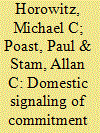

|
|
|
|
|
| Summary/Abstract |
We provide a new perspective on how domestic factors shape the prospects for international cooperation. Internal arms, specifically conscription, signal a willingness and suitability to be a dependable ally. Possessing ineffective military forces inhibits a state’s ability to assist prospective allies and renders a state less able to deter threats on its own. This exemplifies an instance where the trade-off between arms and allies does not apply. Using new data on the military recruitment policies of states since 1816, we find that adopting a conscription-based recruitment system in the previous five years makes a state more likely to form an alliance in the current year, even when accounting for a heightened threat environment.
|
|
|
|
|
|
|
|
|
|
|
|
|
|
|
|
| 2 |
ID:
155189
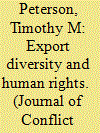

|
|
|
|
|
| Summary/Abstract |
In this article, I synthesize a number of recent studies exploring how exports affect human rights, highlighting a common implication that this relationship is conditional on how exports are associated with leaders’ relative costs of repression and accommodation. Beginning with this synthesis, I develop a theory demonstrating how the composition of exports affects human rights via its impact on leader expectations. More diverse exports promote continued growth and prosperity, provide leaders with greater resources, and suggest conditions less conducive to severe dissent, all of which reduce the relative costs of accommodation. Repression is likely to threaten the benefits otherwise associated with greater export diversity; thus its relative cost increases amid greater export diversity. I test this theory using commodity-level data from the United Nations Comtrade database to create a country-year-level measure of export diversity. Statistical analyses spanning 1981 to 2009 support my expectation. My results are robust to sample restrictions and the use of instrumental variables.
|
|
|
|
|
|
|
|
|
|
|
|
|
|
|
|
| 3 |
ID:
155186
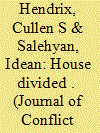

|
|
|
|
|
| Summary/Abstract |
Why do African regimes repress certain contentious challenges but not others? We argue that in addition to opposition claims and tactics, African regimes are especially likely to view challenges expressing ethnic and/or religious claims as threatening. However, in theorizing the decision to use repression, we relax the assumption that the state is a unitary actor. Leaders with a history of factionalism in their security forces face a delegation problem: orders to repress may not be followed or could even cause intraregime violence and/or defections. For this reason, states with divided security forces are less likely to enact repression. This potential for fracturing the regime will be greatest when the challenge has ethnic or religious claims and targets the state, implying an interactive effect. Using the Social Conflict in Africa Database, we find that regimes with a history of past military factionalism are generally less likely to use repression and are especially less likely to repress contentious challenges making ethnic or religious claims.
|
|
|
|
|
|
|
|
|
|
|
|
|
|
|
|
| 4 |
ID:
155190
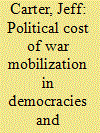

|
|
|
|
|
| Summary/Abstract |
Recent research concludes fighting or losing an interstate war is not costlier for democratic leaders than dictators, which implies most of our institutional explanations for differences in conflict behavior across regime type rest on empirically tenuous assumptions. I argue military mobilization, a fundamental but often overlooked aspect of war, should be costlier for democrats than dictators. Waging interstate war is associated with higher military spending and, often, lower social spending. Variation across regime type in the representation of the general public, civilian elite, and military in leaders’ winning coalitions should make democrats more likely than dictators to lose power given wartime patterns of government spending. This argument finds support during the period from 1950 to 2001. My findings provide microfoundations for a number of existing empirical results and suggest that differences in the conflict behavior of democracies and dictatorships should be largest when waging war requires a significant mobilization effort.
|
|
|
|
|
|
|
|
|
|
|
|
|
|
|
|
| 5 |
ID:
155185


|
|
|
|
|
| Summary/Abstract |
I study civilians’ cooperation with an armed group in an irregular war. In the model, civilians differ in their valuation of siding with the armed group and make cooperation decisions without knowing others’ motivations or cooperation choices. I find that a superior military force is not sufficient to bring high cooperation and that full cooperation can only be attained if military power is complemented by expectations of punishment for helping the enemy. The model challenges the idea that random violence aimed at punishing enemy cooperators is used when selectivity is difficult to implement, and it shows that indiscriminate reprisals induce lower levels of cooperation, even when enemy cooperators are less likely to be punished with selective methods. Finally, I find that communities that have a highly centralized process of decision making are expected to give their support to only one group of combatants and to be exposed to less violence.
|
|
|
|
|
|
|
|
|
|
|
|
|
|
|
|
| 6 |
ID:
155188


|
|
|
|
|
| Summary/Abstract |
In this article, we demonstrate that through their use as tools of military containment, sanctions play an unappreciated role in international politics. We show that sanctions can be used to smooth shifts in relative power that would otherwise lead to preventive war. After presenting a model of shifting relative power and sanctions, we discuss two cases in which sanctions were imposed to destroy an adversary’s military capability. We also explore the implications of this argument for the evaluation of sanctions’ effectiveness. Because sanctions may be deployed as a mechanism to lock in the status quo rather than revise it, the outcome of a sanctions episode must be compared to its counterfactual rather than the status quo ante. Our argument suggests that sanctions may be effectively deployed in response to expected adverse shifts in relative power; therefore observed outcomes disadvantageous to the sanctioning state are insufficient proof that sanctions have failed.
|
|
|
|
|
|
|
|
|
|
|
|
|
|
|
|
| 7 |
ID:
155191


|
|
|
|
|
| Summary/Abstract |
The academic debate concerning public opinion about war focuses upon two explanations: cost/benefits and partisan cues. Both sides of this debate use laboratory experiments to estimate the influence of events and cues, but Gelpi is notable for using a well-designed experiment to compare the theories simultaneously. He argues that his results support the cost/benefits explanation as “surprising events” that counter individuals’ prior attitudes have significantly more effect than “surprising opinions” upon people’s attitudes toward the Iraq War. His analysis, however, considers only the direction, but not the strength, of people’s attitudes toward the war. Additionally, the measure of source credibility for determining the influence of cues is not optimal. When the analysis accounts for attitude strength and uses a better measure of source credibility, the results show little support for the effect of surprising events and markedly greater support for the influence of partisan cues.
|
|
|
|
|
|
|
|
|
|
|
|
|
|
|
|
| 8 |
ID:
155192
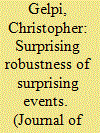

|
|
|
|
|
| Summary/Abstract |
Paolino presents two core critiques of “Performing on Cue.” First, he suggests that my dichotomous measures of support for the Iraq War bias against finding evidence of reinforcing cues. Second, he suggests that using party identification (ID) as a moderator for the treatment effects biases against finding an impact for elite cues. Unfortunately, Paolino’s statistical modeling choices do not reflect these theoretical concerns. His arguments about attitude strength and source credibility imply that the experimental treatments should have nonlinear effects. Yet Paolino relies on an ordinal logit model with a linear interaction of the treatments with a six-point index of party ID and Bush approval. A more appropriate approach for capturing Paolino’s critiques would estimate a multinomial logit model with categorical interaction effects between the treatments and the source credibility. These more appropriate statistical modeling choices reveal that the findings of “Performing on Cue” are very robust to the concerns raised by Paolino.
|
|
|
|
|
|
|
|
|
|
|
|
|
|
|
|
| 9 |
ID:
155184


|
|
|
|
|
| Summary/Abstract |
Insurgency and counterinsurgency are widely described as “population-centric warfare”: a competition between military actors over civilian loyalties. Drawing on a high-resolution conflict event data set and a new approach for analyzing reactive behavior in space and time, this article answers the question of how civilian cooperation and defection are systematically driven by incumbent and insurgent violence. Theoretically, the study contributes to resolving a dispute between proponents of deterrence- and alienation-based approaches to population-centric warfare. Empirically, this analysis improves upon the mixed results from previous microstudies in favor of an integrated picture: indiscriminate violence has almost no effect on collaboration with the adversary in its immediate spatiotemporal vicinity. At larger levels of aggregation, however, a clear reactive pattern of collaboration with the adversary becomes visible which is in line with alienation-based reasoning.
|
|
|
|
|
|
|
|
|
|
|
|
|
|
|
|
|
|
|
|
|